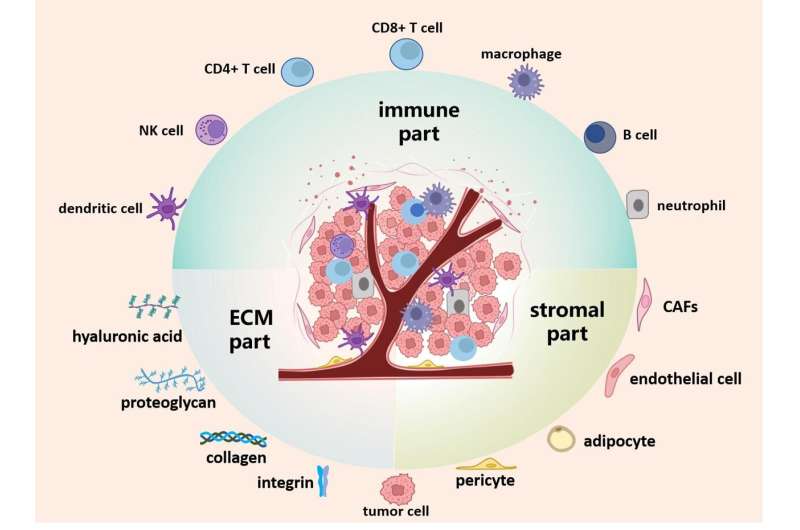This article has been reviewed according to Science X's editorial process and policies. Editors have highlighted the following attributes while ensuring the content's credibility:
fact-checked
proofread
Review explores therapeutic targets in tumor microenvironment

The tumor microenvironment (TME) is the ecosystem surrounding a tumor, which usually consists of non-tumoral cells and molecules they produce and release. The interplay between tumor cells and the TME significantly impacts tumor development, metastasis, as well as responses to therapeutic treatments.
Serving as a reservoir of potential therapeutic targets, the TME has garnered considerable attention and momentum within cancer research. Staying abreast of the latest research in this field is imperative to inform the development of novel cancer therapies. This review delves into the latest advancements in drug and therapy development targeting the TME, offering a promising strategy to inhibit tumor progression at different stages and in multiple cancer types.
This review paper was led by Dr. Yongjun Dang (Basic Medicine Research and Innovation Center for Novel Target and Therapeutic Intervention, Ministry of Education, Institute of Life Sciences, the Second Affiliated Hospital of Chongqing Medical University, College of Pharmacy, Chongqing Medical University).
The review highlights the roles of the three major TME components, including immune cells, stromal cells, and ECM proteins. The review mainly focuses on potential therapeutic targets modulating these three TME components, including targets modulating tumor immune response, indirectly activating the anti-tumor immune response, regulating functions of stromal cells, and key genes directly altering ECM proteins in TME.
During cancer development, tumor cells adapt and evolve, evading the immune response through various mechanisms known as "adaptive immune resistance" (AIR). This review highlights the need to target immune cells effectively to disrupt tumor growth and enhance immunotherapy outcomes. Stromal cells provide a supportive environment for tumor cells and contribute to tumor growth, angiogenesis, and metastasis.
By targeting stromal cells, novel therapeutic strategies aim to disrupt this supportive network, starving the tumor of its necessary resources. ECM provides a structural framework for cells and plays a crucial role in cell adhesion, migration, and signaling. Targeting ECM proteins offers a promising therapeutic approach to disrupt tumor cell interactions and halt cancer progression.
The review concludes with an assessment of the future landscape of cancer treatment in the context of the TME. As research in this field continues to progress, it is imperative to stay abreast of the latest advancements to inform the development of novel cancer therapies. This review provides a valuable resource for researchers and clinicians alike, offering insights into the complex interactions within the TME and potential targets for therapeutic intervention.
As the field of cancer research continues to evolve, these findings offer hope for more effective and targeted treatment options for patients with various types of cancer.
The study is published in the journal MedComm—Oncology.
More information: Ling Zhang et al, Targets of tumor microenvironment for potential drug development, MedComm—Oncology (2024). DOI: 10.1002/mog2.68




















